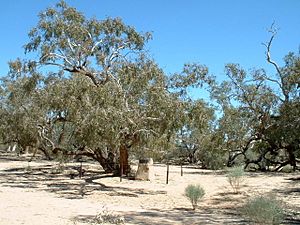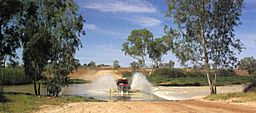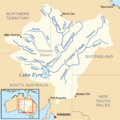Cooper Creek facts for kids
Quick facts for kids Cooper |
|
| Creek | |
|
Cooper Creek Crossing at Innamincka, South Australia
|
|
| Country | Australia |
|---|---|
| State | Queensland and South Australia |
| Tributaries | |
| - left | Thomson River |
| - right | Barcoo River |
| Mouth | |
| - location | Lake Eyre, Far North, South Australia |
| Length | 1,300 km (808 mi) |
Cooper Creek (also known as Cooper's Creek) is one of Australia's most famous rivers. It is sometimes called the Barcoo River because that is one of its main branches. This river is special because it flows inland, away from the coast.
Cooper Creek is one of three big river systems in Queensland that eventually flow into Lake Eyre. The water in Cooper Creek comes from heavy monsoonal rains. These rains fall many months earlier and hundreds of kilometres away in eastern Queensland. At about 1,300 kilometres (810 mi) long, it is the second longest inland river system in Australia. Only the Murray-Darling system is longer.
Contents
Exploring Cooper Creek's Past

The Cooper Creek has an interesting history. It was named in 1845 by explorer Charles Sturt. He named it after Charles Cooper, who was a very important judge in South Australia.
The Burke and Wills Expedition
Cooper Creek is sadly famous for the Burke and Wills expedition. In 1861, explorers Robert O'Hara Burke and William John Wills died near the creek. They ran out of food and water. Another explorer, John King, was the only one of their group to survive. He was helped by local Aboriginal people.
Early Settlements and Changes
Just ten years after Burke and Wills died, people started building farms along the creek. A large farm, called a station, was set up at Innamincka. This became the first lasting settlement in the area.
By 1880, many more settlers came because the creek provided reliable water. They brought lots of cattle to graze. This meant that the local Aboriginal people were pushed off their traditional lands. By 1900, their population was very small, only about 10% of what it used to be. Many became sick from diseases like influenza and measles.
Where Cooper Creek Flows
Cooper Creek starts in Queensland, west of the Great Dividing Range. It forms from two rivers joining together. These are the Thomson River and the Barcoo River. The Thomson River starts near Longreach and Charters Towers. The Barcoo River starts around Barcaldine. These starting points are about 500 kilometres (310 mi) inland from Rockhampton.
The Creek's Journey to Lake Eyre
As it flows south, Cooper Creek spreads out into many different channels. This wide area is known as the Channel Country. The creek then turns west into South Australia, heading towards Lake Eyre.
Most years, the water from Cooper Creek does not reach Lake Eyre. Instead, it soaks into the ground, fills up waterholes, or simply evaporates into the air. However, in very wet years, the creek can flood the entire Channel Country. When this happens, the water can flow all the way to Lake Eyre. It travels through the Strzelecki Desert, Sturt Stony Desert, and the Tirari Desert.
Even though Cooper Creek carries a lot of water, it doesn't reach Lake Eyre as often as the Diamantina and Georgina rivers. This is because a lot more water is lost along its path. During a big flood, Cooper Creek can become incredibly wide, sometimes as much as 40 kilometres (25 mi) across!
How the Land is Used
Most of the land around Cooper Creek is used for farming. Farmers raise sheep and cattle on the natural grasslands. The rainfall here is not steady enough to grow crops. The soil is quite rich, but it can be very heavy and often cracks when it dries out.
Related pages
Images for kids
See also
 In Spanish: Río Cooper para niños
In Spanish: Río Cooper para niños
 | Tommie Smith |
 | Simone Manuel |
 | Shani Davis |
 | Simone Biles |
 | Alice Coachman |



